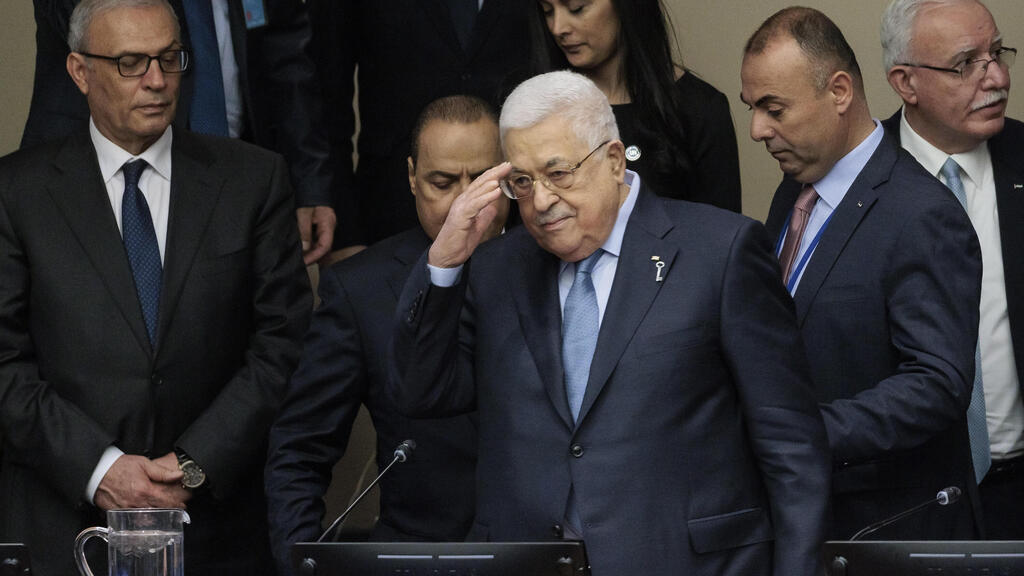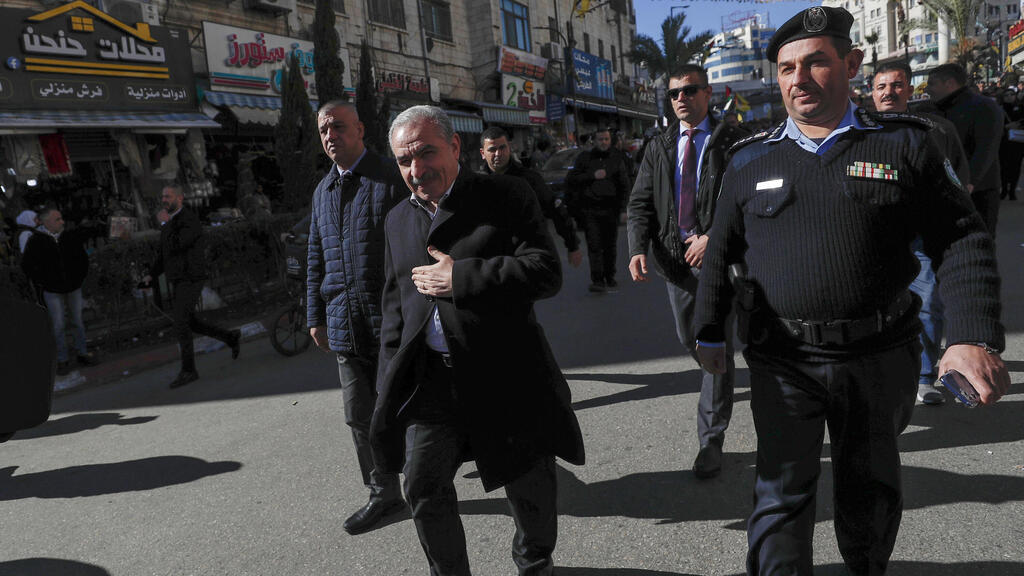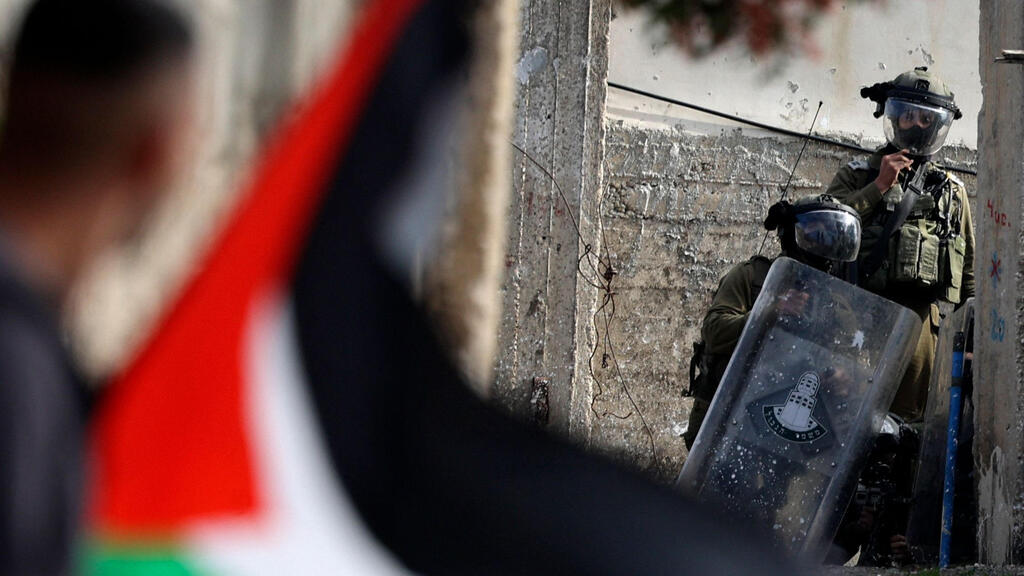Getting your Trinity Audio player ready...
Rumors of imminent changes within the Palestinian Authority government continue to swirl, despite official denials from Ramallah.
More stories:
News of a possible cabinet reshuffle is neither "new" nor "news," an official in PA Prime Minister Mohammad Shtayyeh's office told The Media Line.
3 View gallery


Palestinian Authority President Mahmoud Abbas continues to shake things up in his government
(Photo: EPA )
"The prime minister is continuing with his schedule and it is business as usual," the aide said. "We know that the president wants to make changes. Mr. Shtayyeh has offered his resignation in the past but it was declined, so until we hear the news officially, we will go on as usual."
Earlier this month, PA President Mahmoud Abbas fired 12 provincial governors in the West Bank and Gaza Strip in what many say is part of an "overhaul" in personnel in the political and security structure. The shakeup continued some days later with the announcement of the retirement of 35 of his foreign envoys, all of them over the age of 65.
Experts believe the dismissals are an attempt to promote newer leadership and quell increasing domestic, regional and international criticism of the PA.
Ramallah-based political analyst Esmat Mansour told The Media Line that Abbas’ visit to Jordan contributed to the speed with which he carried out the firings.
"It is not possible for the president to ignore Arab advice, as well as international demands, out of fear for the future and fate of the PA,” Mansour said.
Analysts say the Palestinian leadership is scrambling to appease regional players while satisfying the disgruntled Palestinian street, which sees the PA as ineffective, incompetent and a tool in the hands of Israel.
"Abbas is trying through these decisions to give the impression that he is still influential and in control of things, and that change comes by his own will and is not imposed on him by anyone,” Mansour said.
As part of the shakeup, Abbas is planning a limited cabinet shuffle in the next few weeks, according to Palestinian media outlets. This may affect the current prime minister.
Ramallah-based political analyst Nihad Abu Ghosh told The Media Line that the PA is facing severe challenges to its political existence, putting its future as a viable political entity into question.
"Abbas recognizes his and the PA’s sinking popularity, and we may be in the process of another wave of changes in the PA," Abu Ghosh said.
He said Abbas hopes that the moves will help calm mounting criticism, at least for now.
Without the slightest doubt, the Palestinian political system is suffering from a severe crisis because of the failure to hold elections on time and because of the long reign of Palestinian Authority President Abbas in power, despite the end of his term," Abu Ghosh said.
Abbas, now 87, was elected in 2005 for a four-year term that ended in 2009, and has since then remained in power without any elections being held.
"There is uncertainty about the Palestinian political future in the post-Abbas era. This matter leads to a kind of internal conflict between the centers of power over the caliphate. On the other hand, there is a crisis in the political direction of the Palestinian national project," Abu Ghosh said.
The shakeup comes as Abbas' Fatah party, which runs the PA, grapples with mounting political and economic crises. Many analysts say the Palestinian public is resentful of the PA and of Abbas.
"But all this [shakeup] will not solve the crisis, because the essence of the crisis is in the system as a whole and the lack of presidential and legislative elections," Abu Ghosh said. "There is a whole generation that has not been able to exercise their constitutional right to vote."
Ramallah-based political analyst Fares Sarfandi told The Media Line that the expected ministerial reshuffle will not affect the prime minister or most government ministries.
"Change will not affect the prime minister, it's not related to the sovereign ministries, but rather some service ministries that have a direct impact on people's lives," he said. "This change is superficial. It will not affect the finance or foreign ministers, for example, who have been in their posts for years."
The latest decisions followed a brief and unannounced visit by Abbas to Jordan, where he met King Abdullah II.
A Jordanian official in Amman who asked to remain anonymous told The Media Line that Jordan's intelligence and political officials were concerned about the stability of the PA and about the rising violence between Israelis and Palestinians in the West Bank.
“There are credible reports that Abbas’s control and his inner circle have been compromised,” the official. “We have witnessed a rise in weapons smuggling this year, and the performance of the security apparatus is questionable."
According to the source, Jordanian intelligence officials concerned by the increase in violence have been pointing their fingers at the PA governors and top PA security and intelligence officials.
Violence in the West Bank has risen sharply in 2023. According to officials in Ramallah, at least 220 Palestinians have been killed by the Israeli military, in what the United Nations has described as the deadliest year since the end of the Second Intifada almost 20 years ago. Meanwhile, at least 35 Israelis have been killed by Palestinian attackers during the same period.
The extremist Hamas and Islamic Jihad factions have each claimed responsibility for many of the attacks against Israelis, and both groups have seen their popularity among Palestinians grow rapidly.
"They are both exploiting the security chaos and trying to capitalize on it,” the Jordanian official said, adding that Jordan considers the situation a threat to its own national security.
“Perhaps it is competing with Fatah in the West Bank, and this is not new, but Hamas has its own crises in Gaza,” Abu Ghosh said.
The Jordanian source said that Jordanian intelligence had expressed concerns about the deteriorating security situation in the West Bank and the growing fear that it may lead to the collapse of the PA.
The official said it was for this reason that Abbas was “summoned” to Jordan for an urgent meeting. The message to Abbas was clear, that immediate action must be taken before things spiral out of control.
"Jordan's fear of chaos is understandable, and this is not new. The West Bank is alongside Jordan. It is afraid of chaos, of producing new refugees, or of exporting the Palestinian crisis to Jordan, and this is what Israel wants as well,” Abu Ghosh said.
Changes within the security services are reportedly already underway.
The Media Line has learned that Palestinian intelligence services chief Gen. Majed Faraj has been tasked with recommending replacements for many of the current security leaders.
One of his most important duties is to sift through the top security brass, ensuring that only those with absolute loyalty to Abbas and the officials in charge of their units remain, and not those loyal to previously powerful figures such as Jibril Rajoub, a member of the Central Committee and founder of the Preventive Security Service, or Maj. Gen. Tawfiq al-Tirawi, founder of the General Intelligence Service and former president of the Istiqlal Security University. Both still enjoy widespread support in the security divisions they once directed.
During a recent meeting between Abbas and the heads of the PA security services, he made his dissatisfaction with their performances known and informed them that change was coming.
Observers expect the possible changes also to affect the heads of the security services..
Sarfandi said Jordan has a "real" and "strong" role to play in protecting the Palestinian Authority.
"There is no doubt that there is concern about the internal situation of the [Palestinian] Authority and fear of its collapse and the spread of chaos," he said. "Jordan is the closest and most capable of preserving the situation in the occupied West Bank. Because if things go into chaos, Jordan will pay the price."
The changes also come as a succession battle for the post-Abbas period looms.
"There is a strong struggle over who will succeed the president, and these arrangements may be part of this struggle. This is evident from the marginalization of Jibril Rajoub, for example, and the strengthening of the role of Hussein al-Sheikh [secretary general of the PLO Executive Committee],” Abu Ghosh said..
Reprinted with permission of The Media Line



